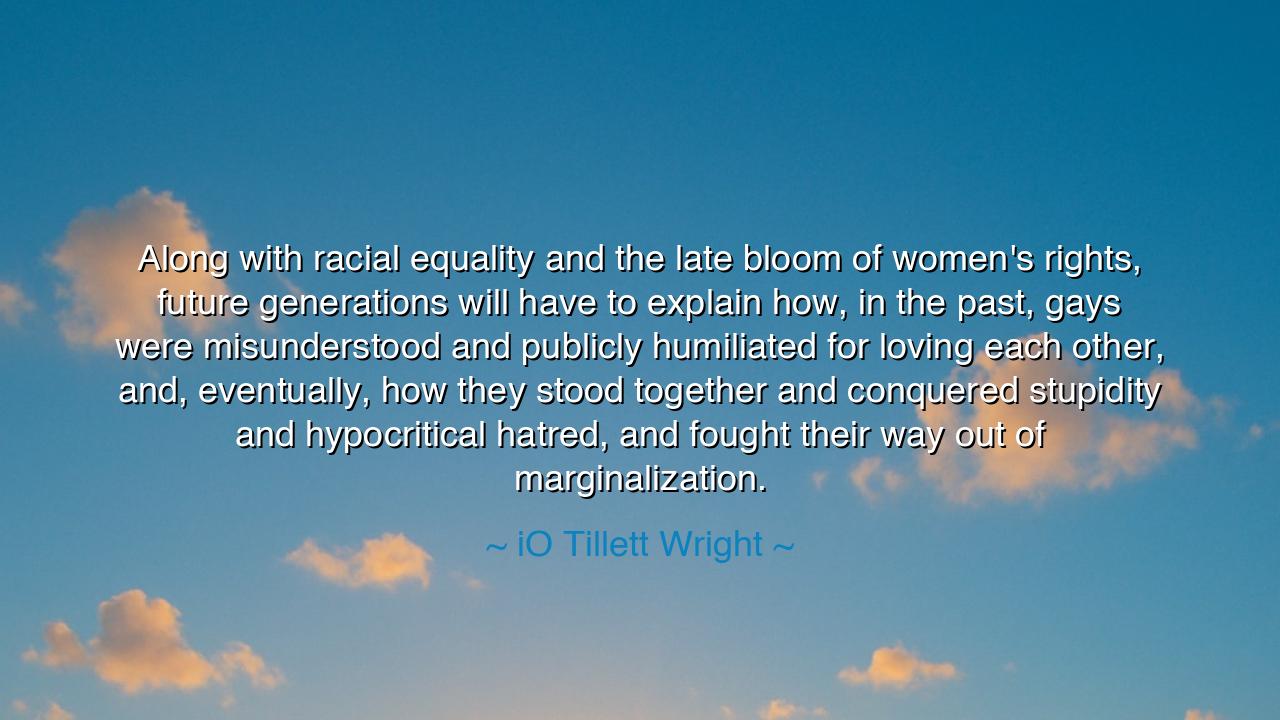
Along with racial equality and the late bloom of women's rights
Along with racial equality and the late bloom of women's rights, future generations will have to explain how, in the past, gays were misunderstood and publicly humiliated for loving each other, and, eventually, how they stood together and conquered stupidity and hypocritical hatred, and fought their way out of marginalization.






When iO Tillett Wright wrote, “Along with racial equality and the late bloom of women's rights, future generations will have to explain how, in the past, gays were misunderstood and publicly humiliated for loving each other, and, eventually, how they stood together and conquered stupidity and hypocritical hatred, and fought their way out of marginalization,” they spoke as both witness and prophet. In these words lies the voice of remembrance — the kind of remembrance that history demands when it has wronged its children. Wright’s words carry the tone of one who has seen injustice laid bare and knows that truth, once revealed, can no longer be buried. They are the words of one who understands that equality is not a gift bestowed by time, but a flame that must be tended through struggle, sacrifice, and love.
The origin of this quote comes from a world still healing from centuries of exclusion. Wright, an artist and activist who grew up amidst questions of identity and belonging, sought to tell the story of those who had been silenced — the LGBTQ+ community, whose humanity had been denied under the guise of morality. Their statement places the fight for gay rights alongside two of the greatest revolutions of conscience: racial equality and women’s liberation. In doing so, Wright situates this movement within the long arc of justice — that eternal unfolding by which the human spirit learns to recognize itself in all its diversity. They speak of a time when love itself was condemned, when affection between two people of the same gender was deemed unnatural, and when to live authentically was to risk one’s safety, family, or life.
Throughout the ages, every great social awakening has followed a pattern — ignorance, resistance, and, finally, recognition. Wright’s words envision the day when future generations will look back upon this struggle with the same disbelief that we now reserve for slavery or the subjugation of women. They will ask, “How could they not see? How could they not understand that love, no matter its form, is sacred?” For in every era, those who are oppressed must endure the blindness of the majority until courage turns oppression into awakening. The journey of the gay community — from shame to pride, from invisibility to affirmation — is the most recent chapter in this ancient book of liberation.
Consider the story of Harvey Milk, the first openly gay man elected to public office in California. In a time when being gay could end a career, destroy a family, or invite violence, Milk chose visibility over safety. He believed, as Wright later would, that dignity is born of truth — that to be silent in the face of hatred is to surrender one’s soul. When he was assassinated in 1978, his death became a spark that lit the fires of a movement. His words — “Hope will never be silent” — became prophecy fulfilled in the generations that followed, in the marches, in the colors of the pride flag, in the marriages once thought impossible. Through such sacrifice, as Wright reminds us, a people once marginalized began to conquer stupidity and hypocritical hatred.
The phrase “stood together” in Wright’s quote is vital, for unity has always been the sword that shatters the chains of prejudice. The fight for gay rights was not won by individuals alone, but by countless souls who refused to yield — activists who marched in the rain, writers who told forbidden stories, and families who learned to love without condition. Together, they reclaimed what society had stolen: the right to exist without apology. Their courage became a beacon, not only for their own liberation, but for every cause that seeks to replace judgment with understanding.
And yet, Wright’s words are not only a reflection — they are a warning. They remind us that progress can wither when forgotten. For the same ignorance that once condemned love can rise again in new forms: intolerance disguised as tradition, indifference masquerading as neutrality. Every generation must guard the hard-won gains of the past, must stand together once more to protect the sanctity of freedom. For the struggle against hatred is not a single battle; it is a perpetual duty.
Thus, the lesson of Wright’s quote is both eternal and urgent: that love is the final revolution. To love without shame is to resist; to accept another’s love without judgment is to heal the world. Let us, then, carry their words as a charge — to remember the pain that birthed our progress, to honor those who stood when standing was dangerous, and to ensure that no child of the future need fight for the right to simply be. For one day, as Wright foretells, the generations yet unborn will look back upon our time and measure us by this one question: Did we stand together? And may the answer be yes — that we, too, fought our way out of marginalization and into the light of understanding.






AAdministratorAdministrator
Welcome, honored guests. Please leave a comment, we will respond soon